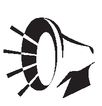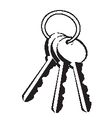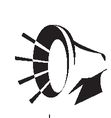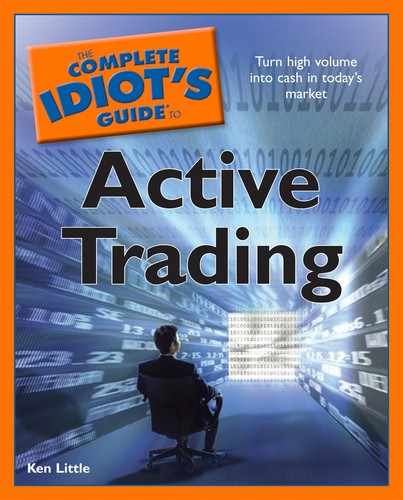Chapter 24
Is Active Trading Right for You?
In This Chapter
• The traits you need to be a successful active trader
• Personality traits that could work against you
• Practice on paper before investing your money
• Alternatives to trading full-time
Active traders can make a lot of money. If you have the tolerance of risk and the willingness to learn, active trading can be a successful business. It won’t be an easy business and you will lose money in the beginning. However, if you have enough investment capital to see you through the startup and learn from your mistakes, you have a chance at success.
Unfortunately, most active traders don’t succeed at full-time trading. They don’t have enough investment capital or are overcome by fear or greed or simply lack the discipline necessary to get out in the market every day and give it their best shot. Closet gamblers looking for a quick jackpot are soon out of money as are those too timid to make trades. Active trading is not for everyone, and if it isn’t for you, it’s better to find out now than after risking your savings. There is no precise formula for what you must do to succeed in active trading, but there are some personality traits, emotional characteristics, and mental capabilities that will make it easier.
Today’s Active Trader
In the stock market, you will see largest gainers and losers lists along with the most active list of stocks. Each stock on these lists represents a potential large gain for active traders. It is not unusual to see stocks that moved up or down three or more points in one trading session. Admittedly, some of these stocks represent obscure companies that won’t easily show up on anyone’s radar, but others could be spotted by astute active traders.
A three-point move in a single day when you are holding 1,000 shares is a $3,000 gross profit. Do active traders make this type of money every day? Some do, but most do not. Those who do have spent a lot of time studying the market and the securities they trade. They learn from their mistakes and remain objective in their trading practices.

Trading Tip
Deciding if active trading is for you is a personal decision, but some personality traits will make it difficult to succeed. Be honest with your self-assessment.
When the market was rocking and rolling during the dot.com boom of the late 1990s, day traders were hauling in big profits. A great many of them confused a market anomaly with trading genius. When the market correction came, they were lost because they did not have the discipline to trade in a market that fought back. The active traders who survived the ensuing bear market came out stronger and smarter—and humbler.
Understand New Strategies, Products, and Markets
One of the differences between the active trader of today and those in the past is that more trading strategies, products, and markets are being used. While most active traders still focus on one type of trading strategy, many have expertise in alternatives in case the market is not right for their primary game plan.
New technology and connections with providers have made trading from home as easy as being at an office. With Web-based services, traders can take their business wherever there is access to high-speed Internet connections. Advanced trading platforms have brought together the technical analysis, fundamental analysis, and news feeds along with an order system that provides super-quick executions. Traders have access to a vast array of tools to help them identify and act on profitable trades almost as fast as market professionals.
Markets such as the forex and products like the e-mini securities have opened new opportunities for active traders that weren’t as common a few years ago. Alternate ways to trade provide new profit opportunities for active traders willing to expand their business into new products or markets. This is a change from the days when active trading meant day trading exclusively.
Market Place
Everyone is a trading genius when the markets are shooting up, but it takes a real professional to survive and thrive in all types of markets.

Margin Call
New markets and new products mean new opportunities for active traders. However, it also means there is an opportunity for traders to spread themselves too thin by attempting to master too many products.
Prepare for Different Markets
If you are going to succeed as an active trader, you must be able to turn a profit in all different types of markets. This means adapting your trading style and even what you trade to different market conditions. Your trading plan that worked well in last month’s market may not work so well this month. What needs to change to get your trading back on track? Earlier in the book, we talk about going with the trend. You may face more than a trend if the market turns from bull to bear or neutral to bullish.

Trading Tip
The preparation for beginning an active trading business should be substantial. Much of it can be done at night and on weekends so you can remain on your present job. This preserves investment capital and lets you prepare without the pressure of bills to be paid and no income.
If the market is very volatile, it may be hard to determine what kind of market you are in—one day it’s up, but the next day it’s down. When patterns are hard to discern, you may have to move back and forth to find profitable trades—remember, active traders make money on declining prices as well as rising prices. There will be other times when the market is coasting in a narrow range, without moving up or down. These markets require a special touch and frequently the use of a swing trading strategy.
At other times, your best strategy may be to go play golf or engage in something other than trading. Active traders know when to walk away and not force trades. The market is always right, no matter how smart you are. When you understand that fact, you’ll be on the road to success. That doesn’t mean the market is always rational, far from it. The market reflects its participants and people aren’t always logical. There are times when this is glaringly apparent, but no one wants to admit it. The dot.com boom of the late 1990s was a perfect example of a market gone mad. However, no one wanted to say anything because they were making so much money. The smart traders made a lot of money, but constantly pulled profits out of their account, so when the bubble burst, they didn’t lose everything.
Active traders were scoring big gains during that time, but if you try for a big gain on every trade, you will soon be out of money. In a normally irrational market, your best strategy is always many small gains (and small losses) rather than trying for the big score every trade.
Market Place
There are still big gains to be had, but it is slow and steady that wins the race. You lower the risk profile of your business and raise the reward potential by increasing the number of trades.
Behaviors That Will Cause Trouble
There are certain behaviors and emotions that will cause problems for active traders (these apply to investors also, by the way). Some are attitudes you can leave behind, while others may be a part of your personality that may cause serious problems in your active trading business. It is important that you take an honest assessment of your personality because kidding yourself won’t solve anything. In a regular business, you can hire someone who is strong in the areas where you are weak. However, in your active trading business it’s only you. If you have a weakness in a critical area, it could be fatal to your active trading business.
Emotional Issues
Emotions are your enemy in active trading. Emotions cloud your judgment and force bad decisions. Many active traders are competitive people—they want to win. The competitive nature of trading is one of the things that attracted them to the business.
Wanting to win is a good thing. Having to win every trade is not. Your goal is to win more trades than you lose, but you are going to lose some trades. If you let your competitive nature gain control of your actions, you’ll stay in losing trades too long trying to turn them around or take other actions that prolong the inevitable, rather than close quickly and move on to the next trade. Your goal should be at the end of the day to say you have more winners than losers and you have net earnings for the day.
If you are an active trader for very long, sooner or later you will have a trade go very bad. A market maker will fool you with a phony order and you’ll take a beating, an order will be screwed up, or something else will happen that will cost you a lot of money. If you have ever thought of revenge when you’ve been treated unfairly, forget it—revenge doesn’t happen in the market. If your pursue revenge, you waste valuable time and energy in a very negative activity.

Margin Call
When emotions rule your actions, you are out of control and you will never make the best decisions. If you find yourself in a rage or depression over a bad trade, it’s time to close all of your positions and take the rest of the day off. If this happens often, you should question whether active trading is the best career choice.
Fear
Fear is one of the two deadly emotions of trading (greed is the other). Fear drives you to bad decisions or it drives you out of the market altogether. Fear usually pops up after a bad loss or series of losses. The fear of losing money is one of the strongest emotions many people experience. If it is so for you, consider another line of work, because you will lose money and maybe a lot of it before you learn active trading. When active traders become fearful, they are very tentative about their trades. They lose confidence in their ability to spot a potentially profitable set up. Some active traders who’ve had their confidence shaken sit out the market for a period and go back to paper trading to affirm their trading plan and skills without the emotions of using real money. When they get their confidence back, they go back to trading with real money. Some people will never overcome the fear of losing their money.
Greed
Greed is the other deadly emotion of trading. Greed happens two ways. The first is when you have had a good streak and want more. Rather than stick with your money management plan, you begin doubling or more the size of your trades. If things don’t continue to go well and you suffer some losses, you may up the size of the trades even more just to recover your losses. The other way greed ruins active trading careers is by being the motivating factor for getting into the business. If the only reason you are becoming an active trader is to get rich, you are probably off to a bad start. Sure, everyone wants to make money, but if your focus is way down the road and not right in front of you, it will be hard to succeed. The way to get rich is by being successful one day at a time. Greed wants it all now and, despite what you may hear or read, active trading seldom works that way.

Trading Tip
Active traders need more than a financial incentive to stick with the business. Most who are successful deeply enjoy the markets and learning about them. They want the financial rewards, but there is more to it than that.
Gambling Issues
People with issues around gambling often find their way into active trading because is seems like a legitimate way to satisfy their needs. Active trading is not gambling. Traders make rational decisions based on evidence, not rolling dice or flipping coins. If you find the casino thrilling and get the same feeling when discussing active trading, that should be a warning sign of trouble ahead. If you approach active trading with the same mindset as gambling, the result will be the same: the house always wins.
Low Tolerance for Risk
A low tolerance for risk will cause trouble for an active trader. This may seem like stating the obvious, but with the number of trading systems being touted as almost “risk-free,” it is important to note that active trading entails risk. In many cases, you are quickly buying and selling in a market that is dominated by professional traders who have access to more information and better technology than you do. These professionals are happy to take your money. You will have a steep learning curve before you can adequately protect yourself from their tactics.
What Will Help You Succeed
Active trading as a business offers many positive qualities to the right people. While some emotions, experience, and behaviors will be obstacles, other personality characteristics will be helpful in your success.
Technological Curiosity
Active trading is about technology. You don’t have to be a computer nerd, but almost everything you do is driven by technology, and as a self-employed business owner you are also the chief technology officer. You should be comfortable learning new software, unafraid of trying out a new online service, familiar with how your computer is set up, and able to perform basic maintenance and repairs. You will place your trades online, do research online, track expenses in an accounting program or spreadsheet, use charting software, and work with other applications. The key applications you use every day, such as the trading platform, should be second nature to you before you begin trading with real dollars. You will be in big trouble if you have to click on “Help” or call tech support every time you want to place a trade or close a position.

Margin Call
If you are a techno-phobe, be careful about a career in active trading. People who are afraid of new software and uncertain about basic computer maintenance will be at a big disadvantage.
Decisiveness
A good active trader is decisive. They see an opportunity that fits their trading strategy and they act on it. Success, particularly in short-term trading, depends on quickly entering and exiting a position. Hesitating or second-guessing will cause traders to miss the window of opportunity. If the trader makes a mistake, he tries to figure out what went wrong so it doesn’t happen again, but a loss doesn’t slow him down.
Independence
Some people thrive when they are in a group, while others prefer to go their own way. Neither is right or wrong, that’s just the way they are. If you value your independence, that will serve you well as an active investor. You want to do it yourself, and that’s why we encourage active traders to organize as a business—to put a structure in place that allows the independent trader to keep focused on trading. If you value the input of a group and seek advice from others before making a decision, active trading as a full-time career is probably not for you.
Investing Experience
People with previous investing experience have an edge when it comes to succeeding as an active trader. Although investing and trading have little in common, they both operate in the same markets and, in many cases, work with the same securities. Some knowledge of the securities markets and products is helpful background information.
Market Place
Investing won’t teach you much about active trading, but you will share some common language, and a basic knowledge of how the markets work will be a big help in getting your active trading business started.
Practice on Paper First
One of the ways you can measure your ability and aptitude as an active trader is to paper trade. Paper trading is practicing using a demonstration account, usually though a broker, but often using real market data. Many of the direct access brokers offer demo accounts, as they are often called. You can sign up for free and try out their software. This will also give you a feel for active trading.
If you are serious about active trading, try out several direct access brokers and choose one that seems most comfortable to you. Go ahead an open an account if there is a limit on how long they will let you paper trade (if you decide active trading is not for you, just cancel the account). Practice paper trading until you learn their software or you decide you are not interested in pursuing active trading. Try out all of the strategies discussed in this book with the exception of position trading, which doesn’t require a direct access broker.
Many of the direct access brokers populate their demo account files with real market data from several days or weeks past. This gives you a feel for what it would be like if you were really trading during market hours.

Trading Tip
Paper trading extends beyond your trading platform. If you subscribe to a charting service, spend time using it so you are familiar with how the interface works. The same goes for news feeds and any other software. All of this prep work should be done before placing your first trade.
Of course, paper trading is never the same as having real money on the line. The emotions discussed above can change a challenging exercise into a time of terror if you are not cut out for this type of trading. On the other hand, you may find you have the focus, patience, and determination to be a successful active trader. You may never know until you try.
Is Active Trading Right for You?
Is active trading right for you? Only you can answer that question honestly, and that’s exactly how you should answer it. As noted earlier, some 80 percent of the people who become full-time active traders don’t succeed. The odds say you are one of them. However, you control most of the factors that determine whether you will succeed or fail as an active trader.
Assuming you want to pursue active trading on a full-time basis, we have outlined what is required. You will need adequate investment capital, which could be as much as $50,000. You will need an office equipped with computers, a high-speed Internet connection, and the proper software. You will need an account with a direct access broker and possibly other subscriptions to news feeds, Level II quotes, and charting software. You will also need a personal reserve fund that will cover your personal expenses (food, mortgage, clothing, and so on) for you and your family for at least three months.
Anyone with enough financial resources can get meet these requirements. Beyond these physical and fiscal requirements, you must be a quick learner and unafraid to lose money in the start-up phase of your business, which could last up to six months.
If you are prepared to spend long hours every trading day in your office with the door closed, learning the market and the securities you trade, you may succeed as an active trader. It is hard, lonely work and if you are used to working in an office full of people, the solitude may be disturbing.
However, the rewards of success can be substantial. In addition to the money, there is the satisfaction of being your own boss and choosing when and where you want to work. That independence is worth a great deal to many people.

Trading Tip
Active trading may appeal to many people, but only a few will have the determination and energy to make a career of it. With adequate resources, above-average intelligence, and determination, you can be one of those who enjoys the life of a successful active trader.
What Are the Alternatives?
We have focused in this book on working full-time as an active trader of stocks. We did this because many active investors trade stocks or at least start with stocks. We focused on full-time because it is ill advised to attempt almost any form of short-term trading (day trading) on a part-time basis. The exception to this might be the forex because it trades around the clock and is oriented towards day trading.
We have noted earlier the reasons a part-time effort at short-term trading is problematic (high cost of needed services). That same argument may not be true for other forms of active trading. Swing trading can be practiced as an intraday strategy or as a multi-day strategy. The multi-day swing strategy that follows broader price changes is a popular form of active trading. It does not require you to watch every tick of the market to participate. Because it is not as intense, you could practice swing trading as a part-time business while you keep your current job. It is not necessary to have a direct access broker to execute this strategy, so you could use a regular discount broker.
The same would be true of position trading, which many would suggest is only called active trading because the hold times may be less than one year. Position trading is something you could absolutely do part-time through a regular discount broker. It requires fundamental research, which you could do in the evenings and on weekends. Since you would not be trading often, unless you held a large number of open positions, checking on your position would be a simple matter. Stops and trailing stops could prevent a loss if you had to be away from access to your broker.
Where Do You Go From Here?
As noted in the introduction, this book is not about selling you on the idea of becoming an active trader. It has laid out an overview of what an active trader is and does. It has touched very briefly on some of the important areas you will need to know in detail, such as technical analysis.
If you wish to pursue the idea of a career further, there are many resources listed in Appendix A that will help you uncover more information about specific areas of active trading.
Active trading can be a financially and emotionally rewarding career, but it is not for everyone, so do your homework. The best decision you can make is the honest one.
The Least You Need to Know
• Today’s active traders have an array of products and markets that weren’t available to traders in the past.
• Some personality traits and behaviors, such as fear and greed, will make success difficult, while decisiveness and persistence can help your active trading career
• If you decide full-time active trading is not for you, consider alternatives such as position trading part-time.
• Practice or paper trading before you invest any money will help you decide if active trading is for you.
..................Content has been hidden....................
You can't read the all page of ebook, please click here login for view all page.
